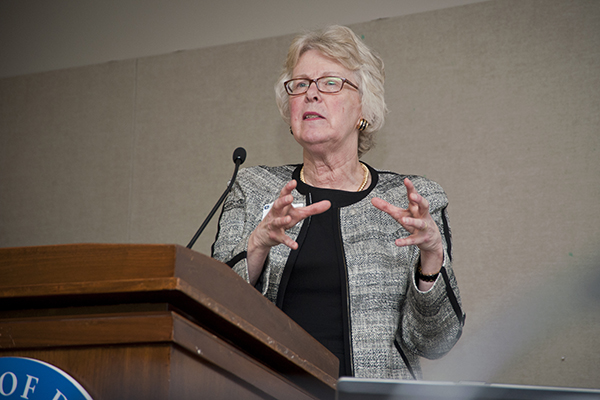
UDARF presentation
Targett meets with retired faculty, discusses plans for moving UD forward
11:54 a.m., May 11, 2015--Nancy Targett, dean of the College of Earth, Ocean, and Environment who will begin service as acting president of the University of Delaware beginning July 1, said during a recent presentation that the future of the University will continue the legacy of success built by its previous leaders.
Targett outlined her vision for the future of UD during a University of Delaware Association of Retired Faculty (UDARF) luncheon held Tuesday, May 5, in Clayton Hall.
People Stories
'Resilience Engineering'
Reviresco June run
University President Patrick T. Harker announced on March 2 that he will be stepping down to become president and chief executive officer of the Federal Reserve Bank of Philadelphia. Later that month, the Board of Trustees selected Targett to serve as acting president during the search for UD's next president.
“It is an honor and an unexpected privilege to be in this role,” Targett said. “I have been at UD for 30 years, and I have a deep commitment to the institution and to the state of Delaware, which is my home.”
Targett described her role as acting president as one of sustaining momentum and building relationships to position UD for continued success when the next president arrives.
“I have to start out by noting that the modern University of Delaware stands on the shoulders of our founders and the 25 previous presidents, especially E. Arthur Trabant and David P. Roselle,” Targett said. “When President Harker arrived in 2007, he embarked on a Path to Prominence, and his goals were to strengthen an already strong faculty, continue to diversify the student body and expand UD’s market base from its traditional Mid-Atlantic flavor to one that was more national and international.”
Converging challenges faced by Harker included adapting to ever-changing technology, facing societal questions about the cost of higher education and dealing with an economic downturn that had a significant impact for public institutions regarding state support, she said.
“Under President Harker’s leadership the University worked to navigate a positive path through that churn,” Targett said. “One of his earliest successes was the acquisition of the 272-acre site that is home to our Science, Technology and Advanced Research, or STAR, Campus.”
Opening its doors in January 2014, the Health Sciences Complex, with its close proximity to I-95 and many opportunities for student internships and community medical services, embodies what STAR is all about, Targett said.
Harker’s leadership also saw the construction of the Interdisciplinary Science and Engineering Laboratory (ISE Lab), Targett said.
“All seven of our colleges teach courses in ISE Lab, designed with connecting and interactive lecture spaces and laboratories,” she said.
Targett noted that the dedication of Louis Redding Hall, the first campus building named for an African American, signals the impact the late civil rights lawyer had on the state and the University.
Redding Hall is part of a first-year neighborhood that includes Eliphalet Gilbert Hall, a renovated Harrington Complex and a new residence hall and dining facility located on Academy Street across from the Perkins Student Center.
“Since 2010, we have provided some $40 million in aid for Delaware residents as part of our Commitment to Delawareans that recognizes our responsibility as the state’s flagship university,” Targett said. “Our in-state tuition and fees are the second lowest among flagship universities in the region.”
The University’s commitment to diversity also highlights its responsibility as a land-grant university, Targett said.
“We are continuing to build on diversity, but we still have a ways to go,” Targett said. “Diversity has to be woven into the fabric of who we are.”
Targett also noted the success of the University’s Associate in Arts Program, and a 329 percent increase in the number of international students since the fall of 2007, as well as significant growth in sponsored research and a state that is ranked second in the nation in peer-reviewed research.
A reengagement with UD alumni also has helped fuel a 142 percent increase in fundraising, thanks to events like Alumni Weekend, Targett said.
“As I have been at alumni events in my role as incoming acting president, I have been amazed at how strong an alliance President Harker has built with our alums,” Targett said. “One of them said to me that ‘We know what all this is about, and we are proud to give and proud to be a part of UD’s future.’”
Her goals as acting president include inspiring and transforming students, undertaking scholarship that enhances basic understanding and fosters solutions and challenges, and continuing to partner with communities and organizations on the local and global level, Targett said.
Such goals will position the University to welcome its next president while taking yet another leap forward, Targett said.
“We want engagement with a consistent eye on the next 20 years so we can build on the accomplishments of all our presidents,” Targett said. “I’m optimistic about our future and I’m incredibly proud to play a part in this.”
Article by Jerry Rhodes
Photo by Wenbo Fan








